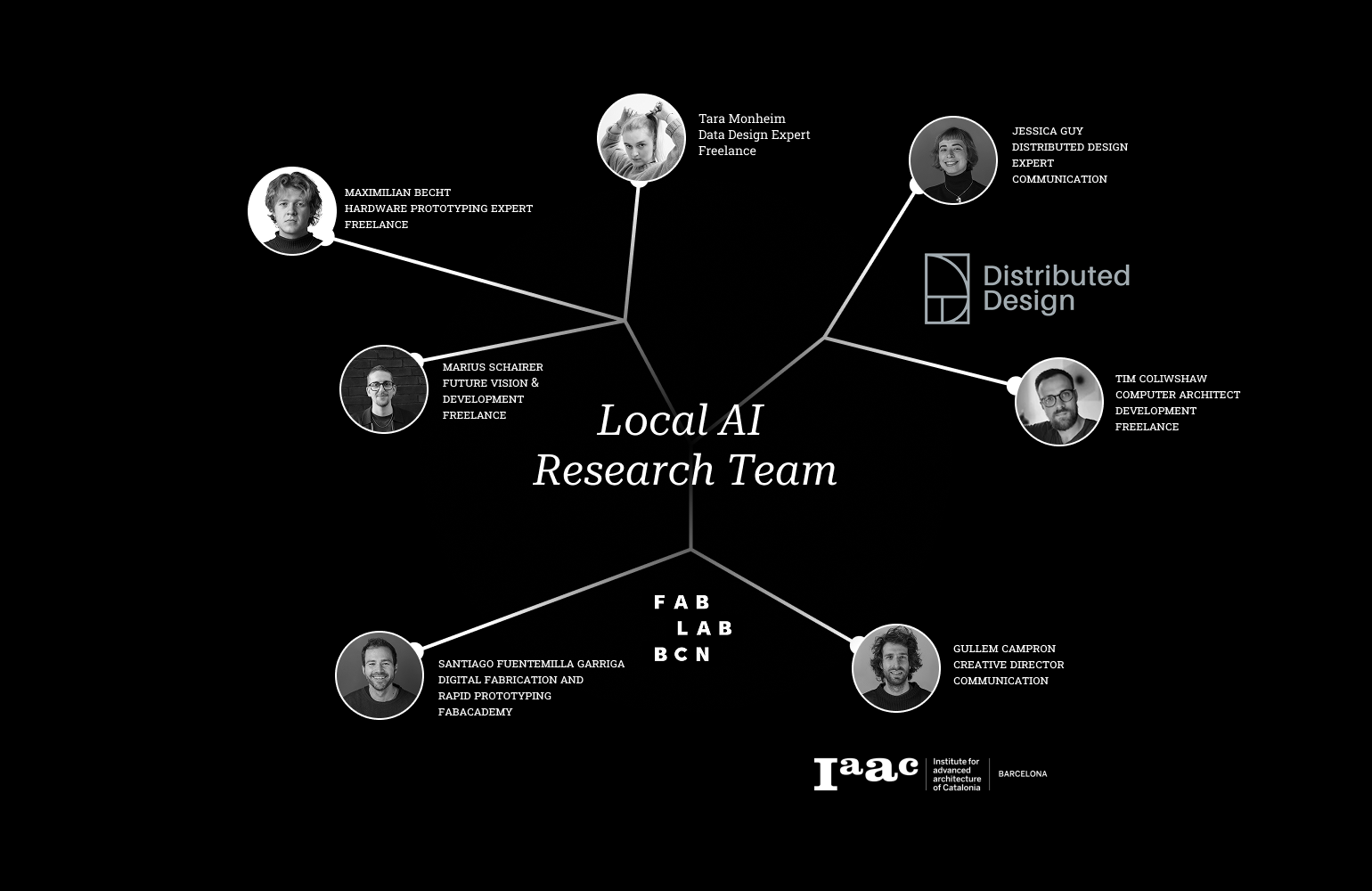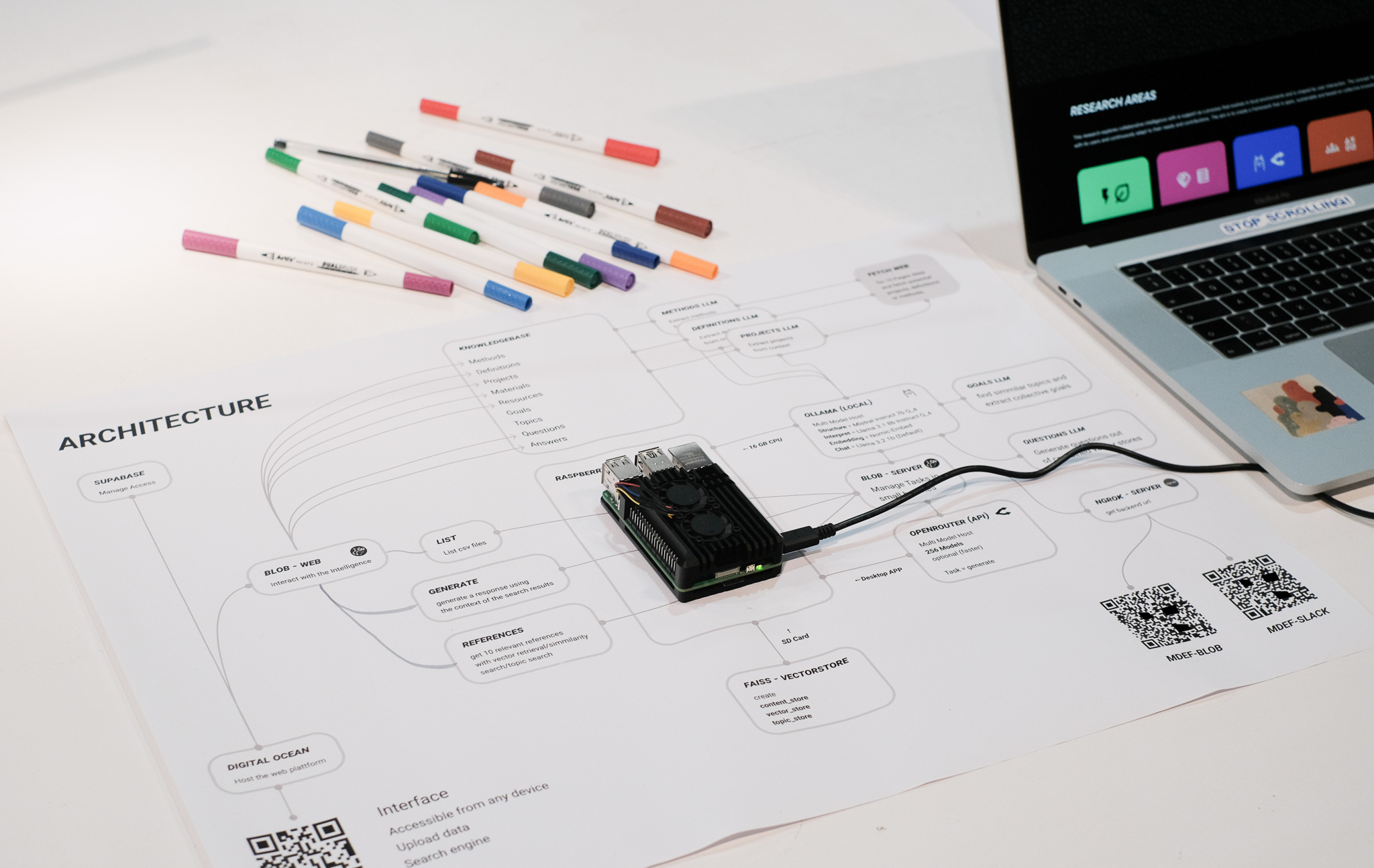Oatflake MVP Released
Local Community AI Knowledge System
Oatflake represents a breakthrough in community-driven AI knowledge systems. Exhibited at the 2025 Design Dialogues 2 of the MDEF faculty, this local Python/JavaScript application combines Ollama and ngrok to create federated knowledge-sharing communities that prioritize privacy and local control.
Development Team

BLOB Research Team
Core Development & Architecture

MDEF Faculty
Testing & Research Collaboration

Community Contributors
Testing & Feedback

Research Team
Algorithm Development

Oatflake MVP: Local Community AI Knowledge System
Project Overview
The breakthrough moment that shaped federated knowledge systems
Oatflake was exhibited at the 2025 Design Dialogues 2 of the MDEF faculty, marking a pivotal moment in community-driven AI development. Trained on student websites, it demonstrated comprehensive knowledge of projects, methods, resources, and definitions, enabling users to evaluate data through Q&A and voting while creating community servers for free.
This exhibition became the breaking moment that shaped our research toward federated knowledge-sharing systems. The success demonstrated that local AI communities could effectively manage and share knowledge while maintaining complete privacy and control over their data.
Key Innovation
Oatflake combines Python, JavaScript, and HTML with Ollama and ngrok to create local community AI systems that operate entirely on-device, ensuring data sovereignty while enabling collaborative intelligence.
The system integrates advanced file processing tools from LangChain to split and prepare text data, along with web scraping capabilities for resource analysis. Community members can add data through a remote interface (see BLOB Browser) and retrieve information for search and generation functionality.
Dual-Track Architecture
Oatflake operates on two complementary tracks: live chat response for immediate user interaction and background learning for continuous model improvement. This design ensures real-time responsiveness while maintaining the system's learning capabilities through local processing with quantized models.
Architecture
Local AI processing with quantized models for community knowledge
Local Processing System
Oatflake operates entirely on local devices using quantized models through Ollama, ensuring complete data sovereignty while providing responsive AI interactions:
Local Model Hosting
Utilizes Ollama to run quantized language models locally on consumer hardware, eliminating the need for external API calls and ensuring complete privacy of conversations and data.
Secure Tunneling
Integrates ngrok for secure community access, allowing remote users to interact with local AI systems through encrypted tunnels while maintaining host control and privacy.
Data Processing Pipeline
Leverages LangChain for advanced text processing, document splitting, and web scraping capabilities, enabling sophisticated data ingestion and preparation for local AI models.
Community Integration
Supports Q&A functionality and voting mechanisms for content evaluation, enabling communities to collaboratively assess and improve their knowledge systems.
Federated Knowledge Sharing
The system enables communities to create autonomous knowledge-sharing networks where each node maintains full control over its data while contributing to collective intelligence through voluntary participation and transparent evaluation processes.
Exhibition Results
Real-world testing and community validation
The Design Dialogues 2 exhibition demonstrated Oatflake's effectiveness in real community knowledge scenarios, validating our approach to local AI systems:
📚 Knowledge Base
Successfully trained on comprehensive MDEF student website data, demonstrating accurate knowledge retrieval across projects and resources
🔒 Local Processing
100% local operation with quantized models - no external API dependencies or data transmission required
💻 Device Compatibility
Runs efficiently on consumer hardware through Ollama, making advanced AI accessible to community organizers
🌐 Community Features
Integrated Q&A and voting systems enable collaborative content evaluation and continuous improvement
Breakthrough Moment
The exhibition marked a pivotal moment in our research, demonstrating that local AI communities can effectively manage knowledge while maintaining complete autonomy. This success directly influenced our transition toward federated knowledge-sharing systems that prioritize community control and data sovereignty.
Future Development
Building the federated knowledge ecosystem
Research Direction
The success of Oatflake at Design Dialogues 2 has shaped our research toward comprehensive federated knowledge-sharing systems that preserve community autonomy while enabling collaborative intelligence.
- Enhanced Local Processing: Improved quantized model efficiency and expanded language model support through Ollama integration
- Community Tools: Advanced voting mechanisms, content curation systems, and collaborative knowledge validation features
- Cross-Platform Integration: Seamless integration with BLOB Browser for enhanced data management and sharing
- Privacy-First Architecture: Advanced secure tunneling and encrypted communication protocols for distributed communities
Community Impact
Our vision extends beyond technical implementation to creating sustainable knowledge communities where data sovereignty and collaborative intelligence coexist. The project demonstrates that local AI can be both powerful and accessible to communities worldwide.
Join Our Research
Oatflake is part of the broader BLOB research initiative exploring democratic AI systems. Connect with our research team to contribute to the future of community-driven artificial intelligence.